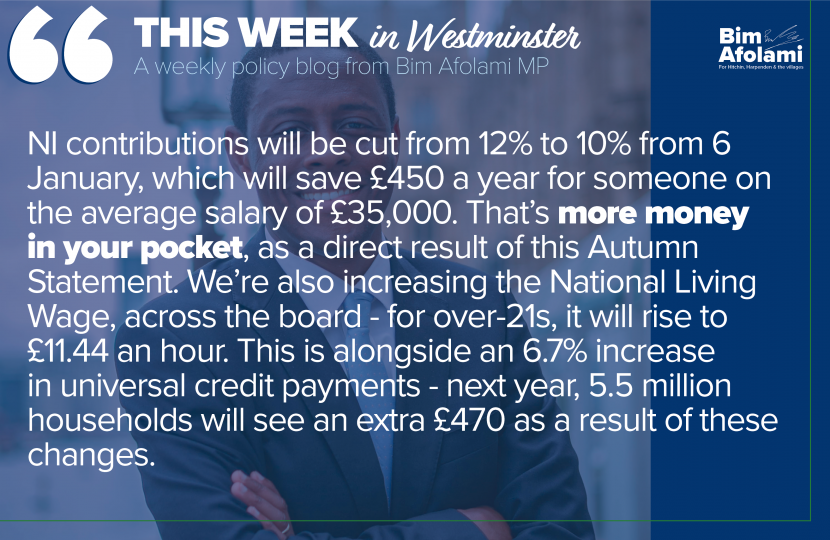
In last week's blog, I set out the new responsibilities that I will be taking on as Economic Secretary to the Treasury (EST). This week, I want to set some more details on my first major milestone in my time as EST - namely last Wednesday's Autumn Statement.
The Chancellor's Autumn Statement set out the Government's analysis of our current economic situation, and its fiscal plans for the next six months. I was delighted to have the opportunity to deliver the Government's closing remarks on Wednesday, wrapping up the day's discussion and reiterating the Government's commitment to economic growth, long-term debt reduction, and fiscal prudence.
So where are we now? In January 2023 the Prime Minister set out three economic priorities: to halve inflation, grow the economy and reduce debt. Consumer Prices Index (CPI) inflation has now more than halved from a peak of over 11% last autumn to 4.6% in October 2023. The economy has recovered from the pandemic more quickly than first thought, grown more than expected this year, and is forecast to grow in every year of the forecast period. Underlying debt is forecast to fall as a proportion of GDP from 2027-28 and the government has greater headroom against its fiscal rules than at Spring Budget 2023.
This is all very well - but what steps is the Government taking to make our economy even stronger, and deliver materially for the British people?
The policy that caught the most attention was the Chancellor's cut to National Insurance. NI contributions will be cut from 12% to 10% from 6 January, which will save £450 a year for someone on the average salary of £35,000. That's more money in your pocket, as a direct result of this Autumn Statement.
We're also increasing the National Living Wage, across the board - for over-21s, it will rise to £11.44 an hour. This is alongside an 6.7% increase in universal credit payments - next year, 5.5 million households will see an extra £470 as a result of these changes.
And these are just the policies that grabbed headlines - we've also frozen alcohol duty, improved the Local Housing Allowance for private renters, continued to increase the state pension under the terms of the triple lock, and continued the implementation of our ambitious post-Brexit reforms to financial services. As part of my brief, I'll be implementing the Government's new Mansion House reforms, which will enable pension funds to invest in more diverse portfolios - that means helping the money that you put away for retirement to go further, while ensuring that we don't have to raise taxes on working people to fund the state pensions.
I am proud to support this Autumn Statement, and to be part of the Treasury team charged with implementing its long-term commitments. I have every faith that the Chancellor's vision for the British economy is shared by the vast majority of people in our community - I am equally sure that my work at the Treasury will allow me to continue delivering for the people of Hitchin, Harpenden and the villages.

